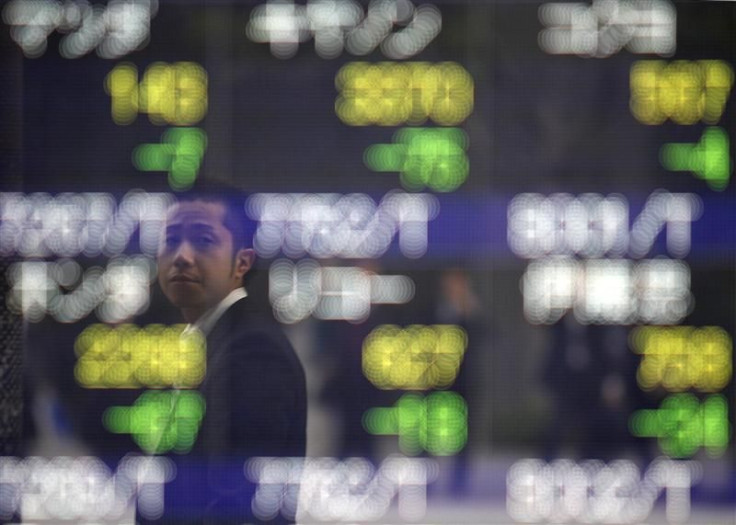Asia Stocks and Euro Edge up After Selloff

Asian stocks and the euro edged up on Tuesday, but sentiment remained fragile on concerns that efforts to contain the euro zone debt crisis were faltering and tougher rules to strengthen banks' capital would further undermine their profits.
The mood in Asian markets was already risk-averse, after the death of North Korea leader Kim Jong-il raised fears of regional instability and prompted a sell-off in riskier assets on Monday as investors switched money into the safe-haven dollar.
Market players said thin pre-holiday trade may exaggerate price swings, but further heavy selling was unlikely until there was another catalyst, such as European sovereign ratings cuts.
MSCI's broadest index of Asia Pacific shares outside Japan <.MIAPJ0000PUS> reached an intraday high of up 0.7 percent on Tuesday, after sliding as much as 2.9 percent the day before. South Korea's benchmark index <.KS11> outperformed with a 0.7 percent rise, after plunging as much as 5 percent on news of Kim's death.
Tokyo's Nikkei share average <.N225> ended up 0.5 percent, moving away from Monday's three-week low.
European stocks were seen weak, with financial spreadbetters expecting London's FTSE <.FTSE> to open down 0.2 percent, Frankfurt's DAX <.GDAXI> down 0.3 percent, and Paris' CAC-40 <.FCHI> to start 0.2 percent lower.
Kim's death triggered immediate nervousness in northeast Asia, with South Korea stepping up its military alert, while Beijing, Pyongyang's neighbor and only powerful ally, affirmed its close ties. North Korea appears to have identified Kim's youngest son, Kim Jong-un, as his successor.
Developments overnight helped ease some risks of immediate disorder ... triggering a rebound across the markets, which were spooked and overshot yesterday, said Makoto Noji, senior strategist at SMBC Nikko Securities.
But it's nothing more than buying back in oversold markets, given very little positive news to recover confidence, he said.
On the other hand, the sell-off induced by European debt woes has driven valuations of some Asian shares attractively low, including Chinese banks, while signs of an improving U.S. economy even if Europe faces downside risks prompted some U.S. money managers to boost equity holdings.
EUROPE WOES CAP
European officials failed on Monday to boost resources at the International Monetary Fund by a targeted 200 billion euros, agreeing to raise 150 billion euros and leaving doubts about whether the scheme would work with London, Washington and Germany's Bundesbank unenthusiastic.
The increase in the IMF resources was seen as a vital part of Europe's steps to prevent the debt crisis from spinning out of control given worries that the region's scheduled permanent bailout fund is insufficient to handle the debt problems.
European policymakers made some progress in pursuing regional fiscal consolidation earlier in the month, but their failure to nail down a convincing commitment for the crucial bailout program has prompted rating agencies to warn of downgrades for several euro zone countries, including France.
Credit ratings cuts of core European economies would further cripple the ability of highly-indebted euro zone countries to tap funds as they face soaring borrowing costs, and could derail progress towards resolving the euro zone's debt crisis.
The euro hovered around $1.3010 on Tuesday, up a little on the day and off Monday's low of around $1.2983. It hit an 11-month low of $1.2944 last week.
Concerns about the European situation will keep the euro under pressure even if it manages short-term rises, said Sumino Kamei, a senior currency analyst at Bank of Tokyo-Mitsubishi UFJ.
Commodities also steadied after coming under selling pressures on Monday, with three-month copper on the London Metal Exchange up 0.3 percent to $7,279.50 a tonne.
Oil prices rose on renewed concerns over supply disruptions and further signs of U.S. economic growth accelerating. U.S. crude futures rose 0.5 percent to $94.34 a barrel, while gold edged 0.3 percent higher to $1,597.30 an ounce.
Stability in other markets calmed Asian credit markets, with
spreads on the iTraxx Asia ex-Japan investment grade index narrowing by a couple of basis points.
(Additional reporting by Lisa Twaronite in Tokyo; Editing by Alex Richardson)
© Copyright Thomson Reuters 2024. All rights reserved.





















